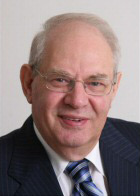Due Diligence: Arkady Gaidamak Is Pro-Government
October 14, 05
When a man who hitherto used to live in the shadows, shunning publicity and preferring to operate as a quiet power-broker, suddenly makes great efforts to become a popular highly visible media personality, this is not only curious – but also invites comments. I refer, of course, to Arkady Gaidamak, often viewed as one of the behind-the-scenes diamond men in
A Russian oligarch in diamonds is always an intriguing subject – and a nightmare for those who need to look into his background. In a business in which banks and companies increasingly are legally obligated to conduct “due diligence” on suppliers and clients, it is not easy to ascertain the thoughts and philosophies of the man.
That changed this week when he acquired the Moskovskiye Novosti, a leading Russian liberal publication from the time of perestroika. The St. Petersburg Times reported that “Arkady Gaidamak, a Moscow-born businessman with four passports and a controversial past, confirms that he had bought the weekly newspaper.”
No details of the deal were given. It is known that Moskovskiye Novosti had been owned by Ukrainian media magnate Vadim Rabinovich, who, only a few months ago, acquired it from Leonid Nevzlin, who lives in
The answer can be found in an interview published in
"Newspapers, which are responsible for public opinion, should not direct the public against the powers that be," Gaidamak was quoted by Kommersant as saying. "If the political and administrative structures in
Getting closer to President Vladimir Putin by investing in a newspaper (that also publishes Moscow News, an English language edition) which will serve as an active supporter of government, is certainly not a dumb move. Something is happening in the Russian natural resources sector and Gaidamak isn’t blind.
Over the past year
Alexei Simonov, head of the Glasnost Defense Foundation, a media freedom watchdog, said in a newspaper that Gaidamak's purchase of Moskovskiye Novosti appeared to be a show of loyalty to the state that was motivated by his business ambitions. "He cynically said out loud what other oligarchs are doing but prefer to keep quiet about," Simonov said. "Gaidamak is just canceling 15 years of activity at a respected newspaper."
When one seeks publicity, one gets it. That seems to be generally the case, and this is no exception. Russian newspapers as a matter of fact recall – while reporting the newspaper purchase – that Gaidamak was once better known for his alleged involvement in a scheme in 1993 to provide arms to Angola during its civil war, and for his role in negotiating a reduction in Angola’s Soviet-era debt to Russia in 1996. He remains an adviser to
In 2000, the French put out a warrant for his arrest in connection with the Angolan arms-for-oil scandal, in which the son of former French President Francois Mitterrand was briefly jailed on charges of receiving kickbacks from Gaidamak’s business partner Pierre Falcone. Gaidamak and Falcone allegedly arranged for shipments of Russian arms that were to have been paid for with Angolan oil contracts. There was an international ban on weapon sales to
In the interest of fairness we want to add that Gaidamak has always maintained that the oil-for-arms deal and his involvement in it was a legitimate transaction between the governments of
What is the relevancy to the diamond business? Gaidamak seems to be close to Alexander Nichiporuk, the president of Alrosa. [Some say the relationship has little substance, but we don’t know that.] Gaidamak seems still to be close to the Angolan government and he is definitely involved in
But the show must go on and the “new Gaidamak” is also getting involved in Russian Jewish community affairs, in basketball and all kind of other rather innocent but high profile activities. Recently, for example, he was elected head of the Congress of Jewish Communities and Organizations, one of
We will, however, closely watch (and try to follow) Moskovskiye Novosti. If the purpose of the purchase is to support President Vladimir Putin the newspaper may just become an important source for diamond news. We don’t know what the president plans for the diamond business – but now we sure know where to get the latest news.
Have a nice weekend.